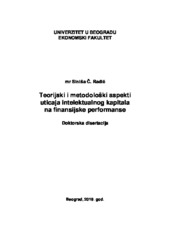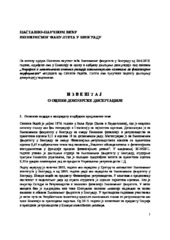Prikaz osnovnih podataka o disertaciji
Teorijski i metodološki aspekti uticaja intelektualnog kapitala na finansijske performanse
The impact of intellectual capital on financial performance - the theoretical and methodological aspects
| dc.contributor.advisor | Malinić, Dejan | |
| dc.contributor.other | Dragutinović-Mitrović, Radmila | |
| dc.contributor.other | Spasić, Dejan | |
| dc.creator | Radić, Siniša | |
| dc.date.accessioned | 2020-03-13T23:36:17Z | |
| dc.date.available | 2020-03-13T23:36:17Z | |
| dc.date.available | 2020-07-03T08:32:05Z | |
| dc.date.issued | 2019-10-08 | |
| dc.identifier.uri | http://eteze.bg.ac.rs/application/showtheses?thesesId=7366 | |
| dc.identifier.uri | https://nardus.mpn.gov.rs/handle/123456789/12276 | |
| dc.identifier.uri | https://fedorabg.bg.ac.rs/fedora/get/o:21654/bdef:Content/download | |
| dc.identifier.uri | http://vbs.rs/scripts/cobiss?command=DISPLAY&base=70036&RID=51940623 | |
| dc.description.abstract | U teoriji i praksi menadžmenta dominira stav da je intelektualni kapital osnov konkurentske prednosti u ekonomiji znanja. Međutim, merenje efekata ulaganja u intelektualne resurse nije jednostavno i profesionalna regulativa ne uspeva da odgovori izazovima finansijskog izveštavanja na ovom području. Nosioci odgovornosti u procesu finansijskog izveštavanja treba da budu upoznati sa alternativama koje su im u ovom domenu na raspolaganju. U tom kontekstu obelodanjivanje kao segment finansijskog izveštavanja sve više dobija na značaju, pogotovo što je verodostojna prezentacija izbila na vrh hijerarhije zahtevanih kvalitativnih karakteristika računovodstvenih informacija. Informisanje javnosti o korišćenim pretpostavkama i metodama merenja vrednosti intelektualnih resursa bitno je i u sagledavanju značaja ovih resursa u kreiranju sadašnjih i budućih performansi izveštajnih entiteta. Značajan deo disertacije upravo je zbog toga posvećen problematici vrednovanja intelektualnih resursa. U razvijenim privredama bankarsko poslovanje je znanjem intenzivna delatnost koja se odvija u izrazito konkurentskom poslovnom okruženju. Efikasna interakcija ljudskog, strukturnog i relacionog kapitala je ključna za uspešnu realizaciju definisane strategije poslovnih banaka, kao i za njihov opstanak i rast. Prethodna istraživanja su pokazala da navedeni zaključak nije u potpunosti primenjiv na banke koje posluju u privredama koje su po karakteristikama i stepenu razvijenosti slične srpskoj, te da one svoje performanse i dalje pretežno baziraju na fizičkom i finansijskom kapitalu. Cilj empirijskog istraživanja u ovoj disertaciji, sprovedenog ekonometrijskom analizom podataka iz finansijskih izveštaja, jeste da se sagleda uticaj efikasne upotrebe intelektualnog kapitala i njegovih komponenti na finansijske performanse poslovnih banaka u Srbiji. U tu svrhu primenjena je metodologija Koeficijenta dodate vrednosti intelektualnog kapitala (Value Added Intellectual Coefficient - VAIC). U istraživanju je prvo ispitan nivo obelodanjivanja informacija o komponentama intelektualnog kapitala i povezanim rizicima banaka koje posluju u Srbiji u poređenju sa relevantnom praksom koju u ovom domenu sprovode najveće evropske banke (odabrane prema kriterijumu vrednosti ukupne bilansne aktive, bez banaka koje imaju sedište u Velikoj Britaniji). U tom smislu potvrđena je hipoteza da poslovne banke u Srbiji prilično zaostaju po pitanju razvijenosti prakse izveštavanja o najvažnijim intelektualnim resursima na kojima baziraju svoje poslovanje i rizicima povezanim sa upotrebom tih resursa u odnosu na velike evropske banke, čije su javno dostupne informacije bile predmet analize u istraživanju. | sr |
| dc.description.abstract | In the theory and practice of management the opinion prevails that intellectual capital is the basis of competitive advantage in the knowledge economy. However, measuring the effects of investments in intellectual resources is not straightforward and professional regulation fails to respond to challenges of financial reporting in this area. In the financial reporting process responsible persons should be familiar with the available alternatives in this domain. In this regard, disclosure as a segment of financial reporting is increasingly gaining in significance, especially since fair presentation has become the most important among the required qualitative characteristics of accounting information. Providing information on the assumptions and methods of intellectual asset valuation employed is key to understanding the importance of these resources in creating current and future performance of reporting entities. That is why a significant part of this dissertation is dedicated to the valuation of intellectual resources. In developed economies banking is a knowledge-intensive activity that is carried out in a highly competitive business environment. An effective interaction between human, structural and relational capital is crucial for the successful implementation of commercial banks’ defined strategy, as well as for their survival and growth. Previous research has shown that this conclusion may not apply to banks operating in economies that are similar in characteristics and the level of development to the Serbian economy. These banks continue to base their performance predominantly on physical and financial capital. The aim of empirical research in this dissertation, which was carried out using econometric analysis based on financial statement data, was to analyze the impact of the efficient use of intellectual capital and its components on the financial performance of commercial banks in Serbia. For this purpose the Value Added Intellectual Coefficient (VAIC) method was used. The research first examined the level of disclosure of information on intellectual capital components and the associated risks of banks operating in Serbia and compared it to the best practice of the largest European banks (determined by the amount of their total assets, excluding banks established in the United Kingdom). It was confirmed that the practice of reporting on the most important intellectual resources on which banks base their operations, as well as the associated risks in commercial banks in Serbia lag far behind the largest European banks, whose publicly available information was also analyzed in this research. | en |
| dc.format | application/pdf | |
| dc.language | sr | |
| dc.publisher | Универзитет у Београду, Економски факултет | sr |
| dc.rights | openAccess | en |
| dc.rights.uri | https://creativecommons.org/licenses/by-nc/4.0/ | |
| dc.source | Универзитет у Београду | sr |
| dc.subject | intelektualni kapital | sr |
| dc.subject | intellectual capital | en |
| dc.subject | ljudski kapital | sr |
| dc.subject | strukturni kapital | sr |
| dc.subject | relacioni kapital | sr |
| dc.subject | vrednovanje | sr |
| dc.subject | finansijsko izveštavanje | sr |
| dc.subject | izveštavanje o rizicima | sr |
| dc.subject | poslovne banke | sr |
| dc.subject | Koeficijent dodate vrednosti intelektualnog kapitala. | sr |
| dc.subject | human capital | en |
| dc.subject | structural capital | en |
| dc.subject | relational capital | en |
| dc.subject | valuation | en |
| dc.subject | financial reporting | en |
| dc.subject | risk reporting | en |
| dc.subject | commercial banks | en |
| dc.subject | Value Added Intellectual Coefficient (VAIC) | en |
| dc.title | Teorijski i metodološki aspekti uticaja intelektualnog kapitala na finansijske performanse | sr |
| dc.title.alternative | The impact of intellectual capital on financial performance - the theoretical and methodological aspects | en |
| dc.type | doctoralThesis | en |
| dc.rights.license | BY-NC | |
| dc.identifier.fulltext | https://nardus.mpn.gov.rs/bitstream/id/4879/Disertacija.pdf | |
| dc.identifier.fulltext | https://nardus.mpn.gov.rs/bitstream/id/4880/IzvestajKomisije22429.pdf | |
| dc.identifier.rcub | https://hdl.handle.net/21.15107/rcub_nardus_12276 |



